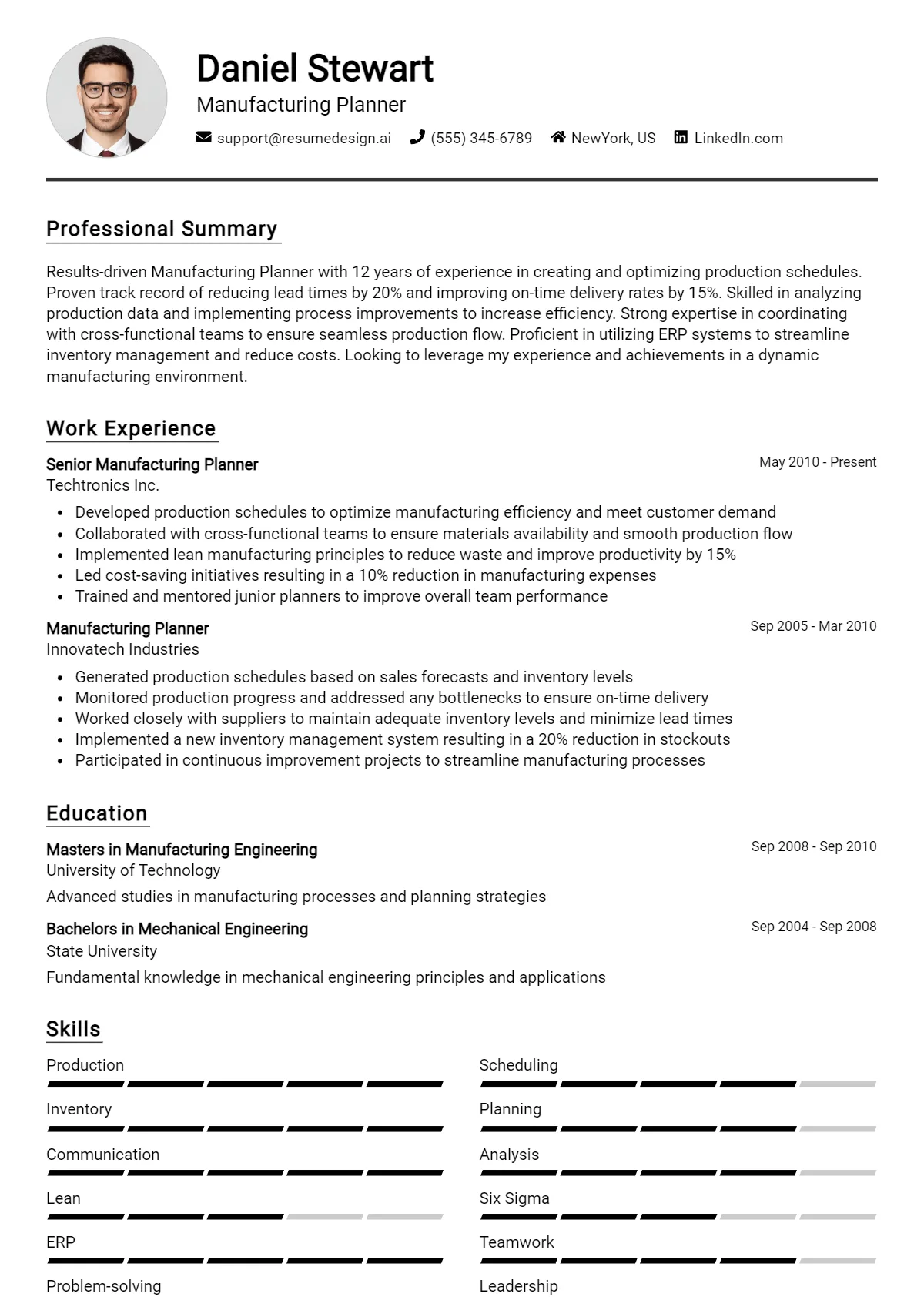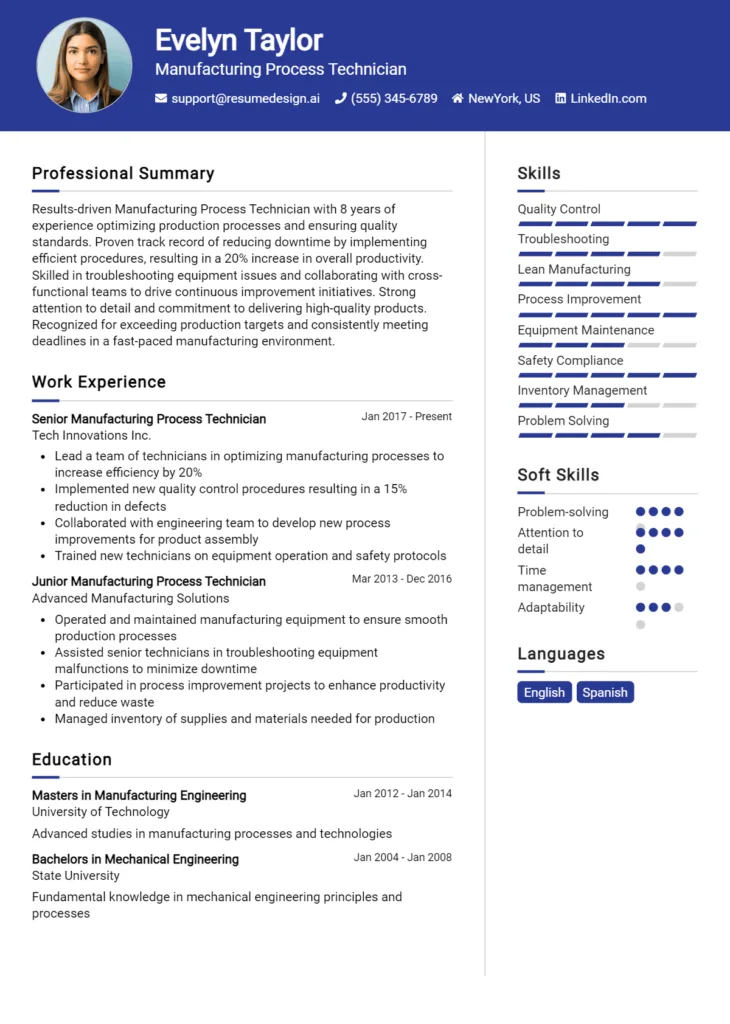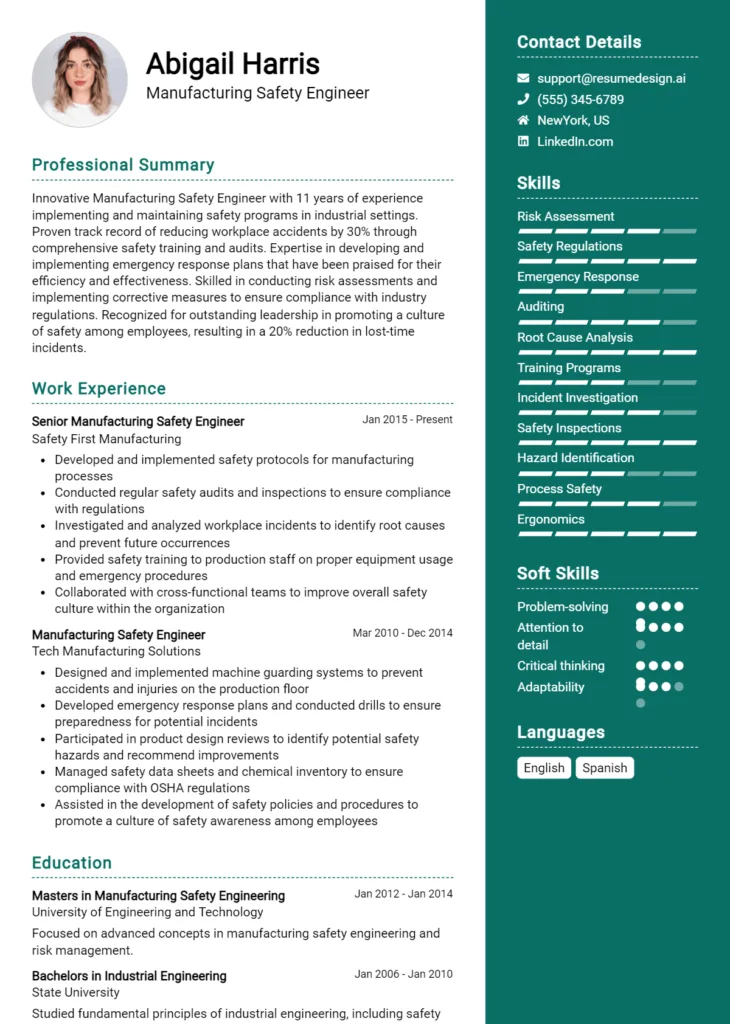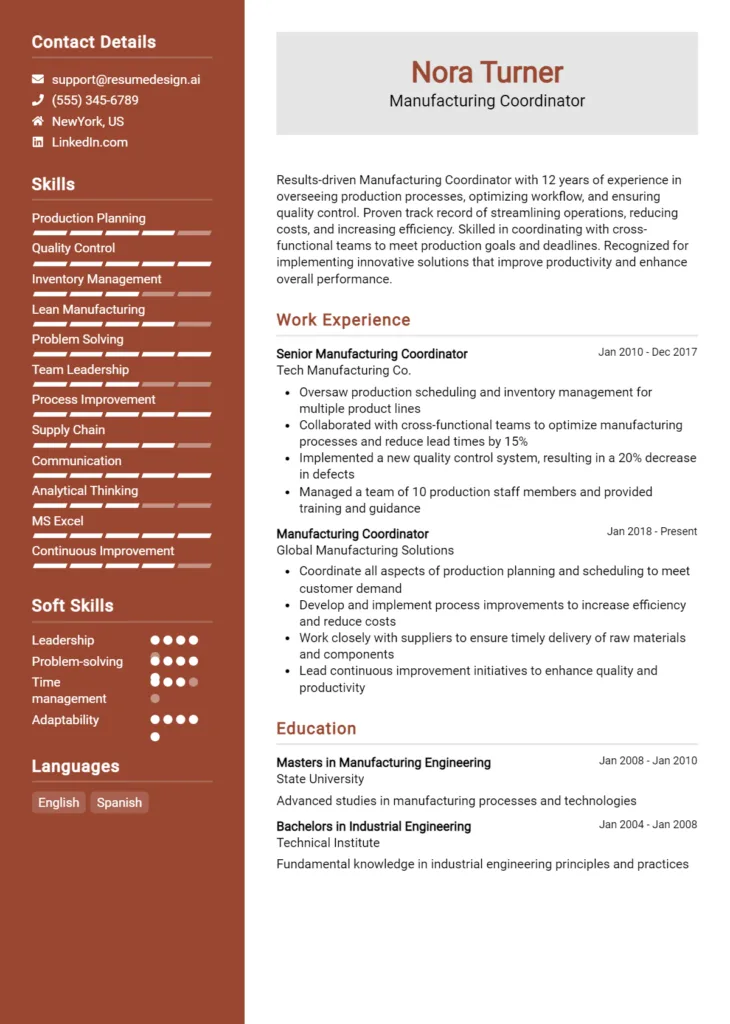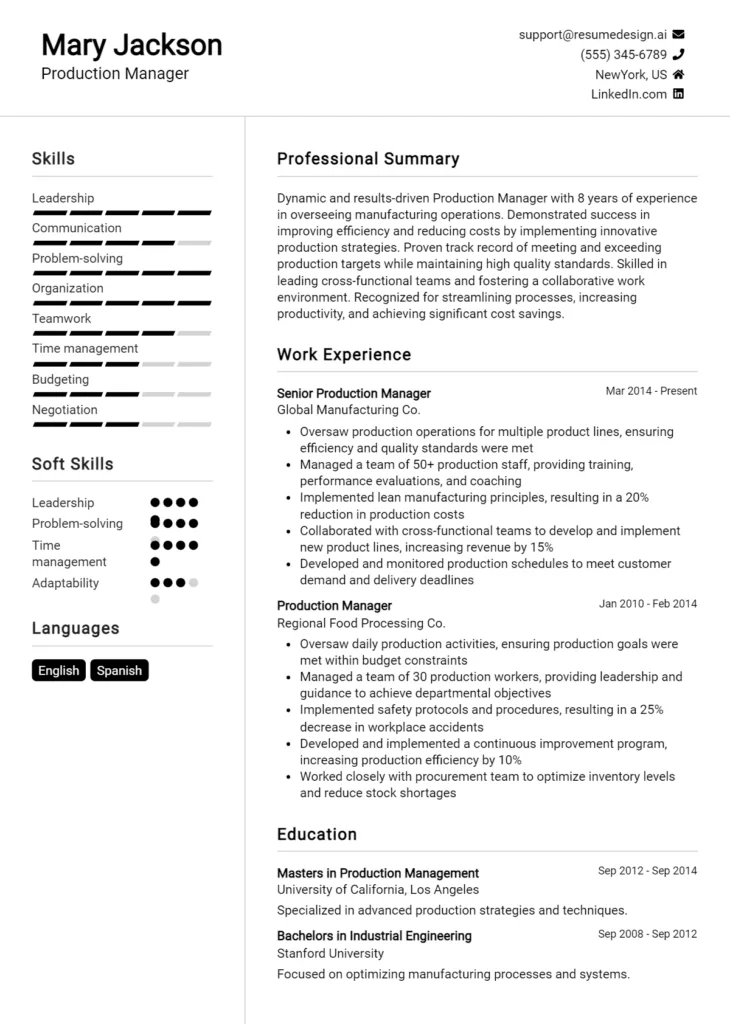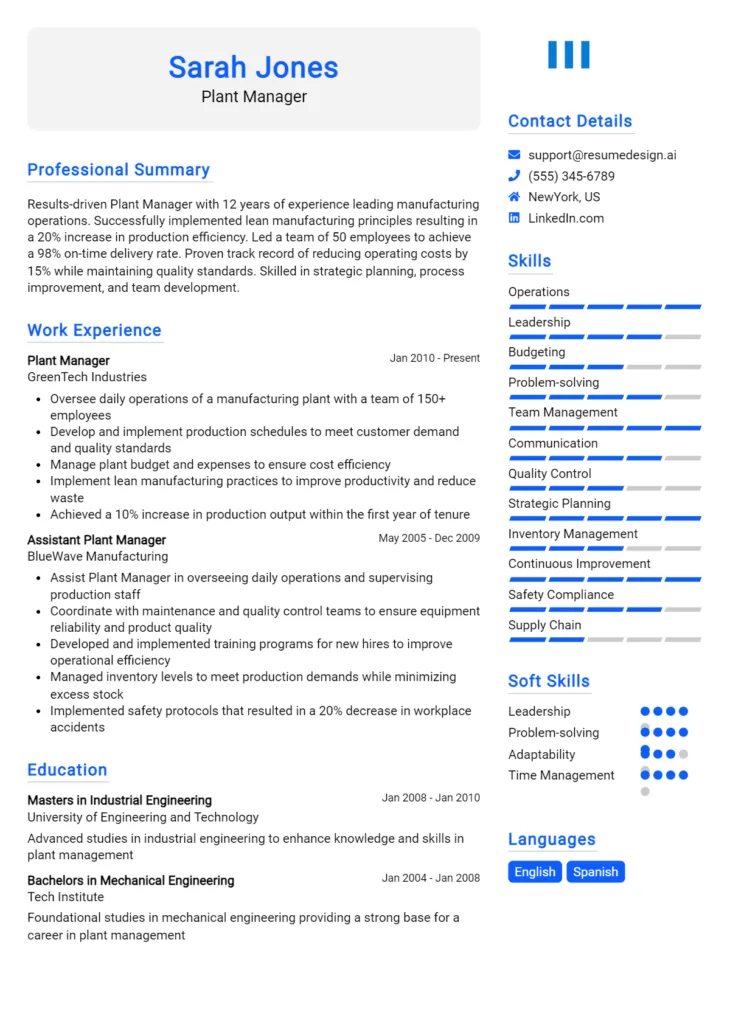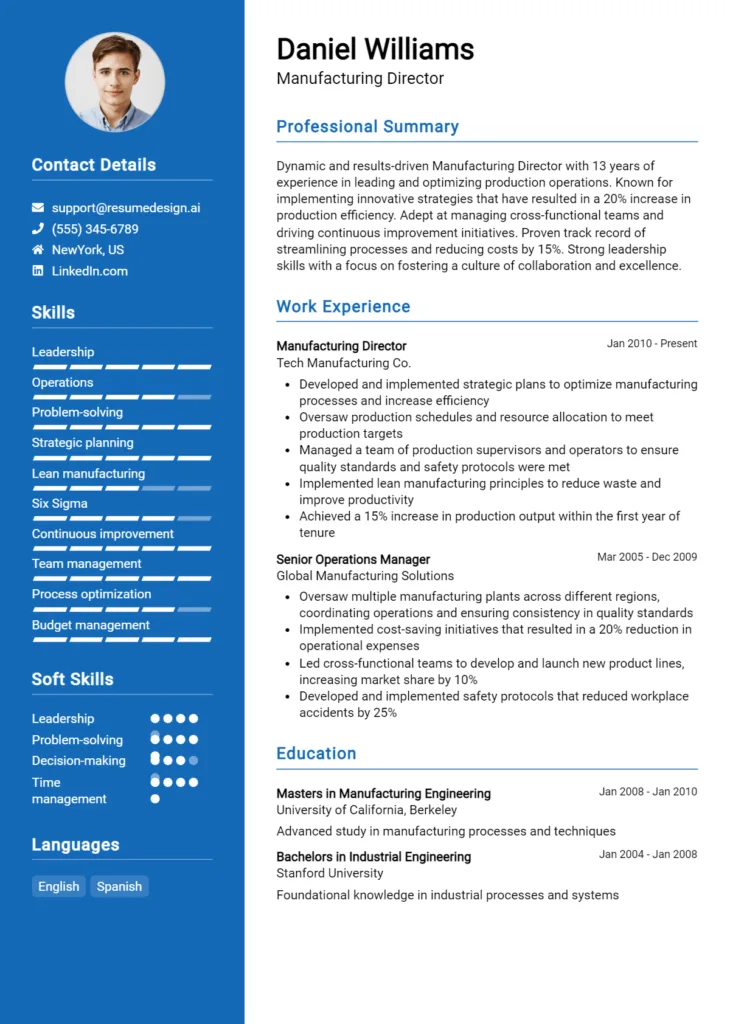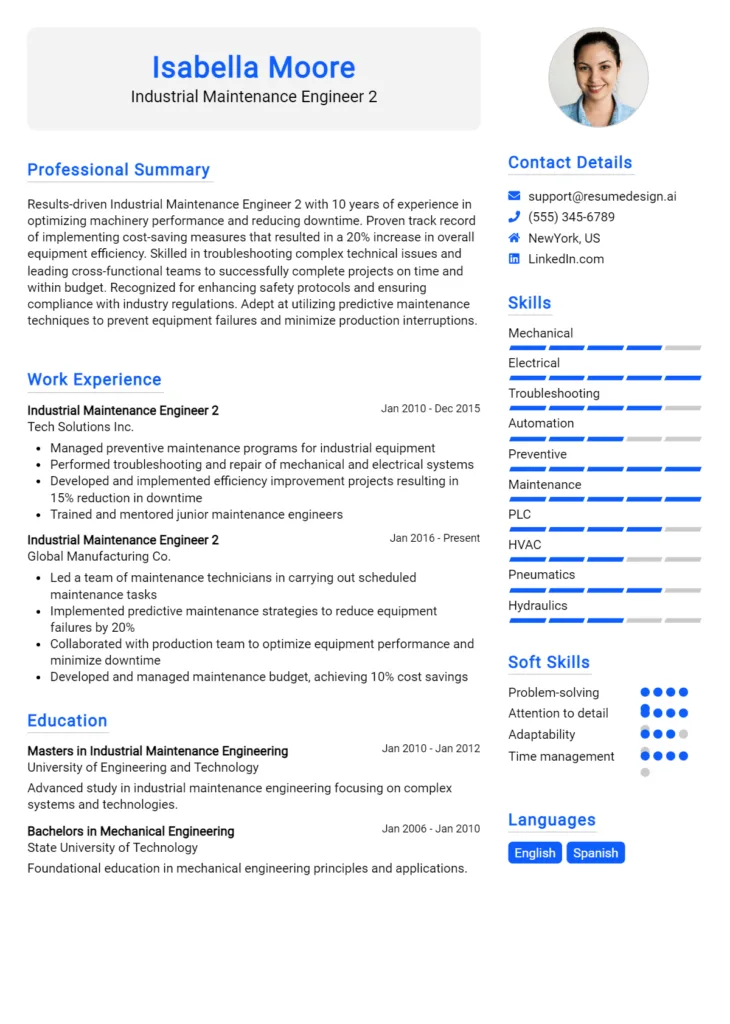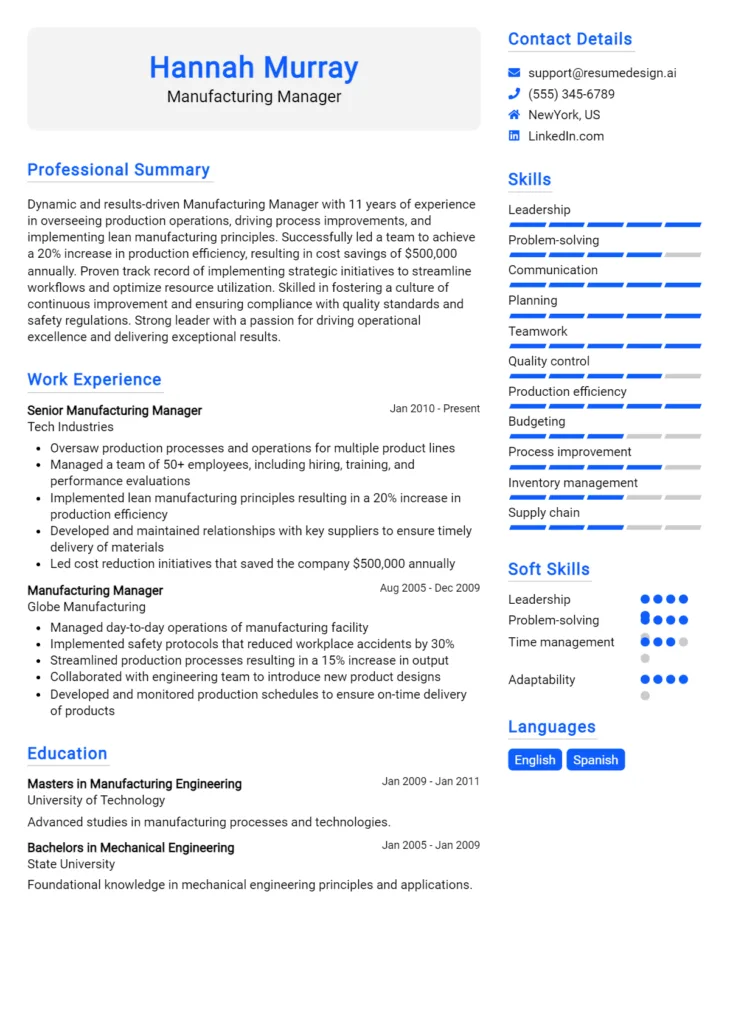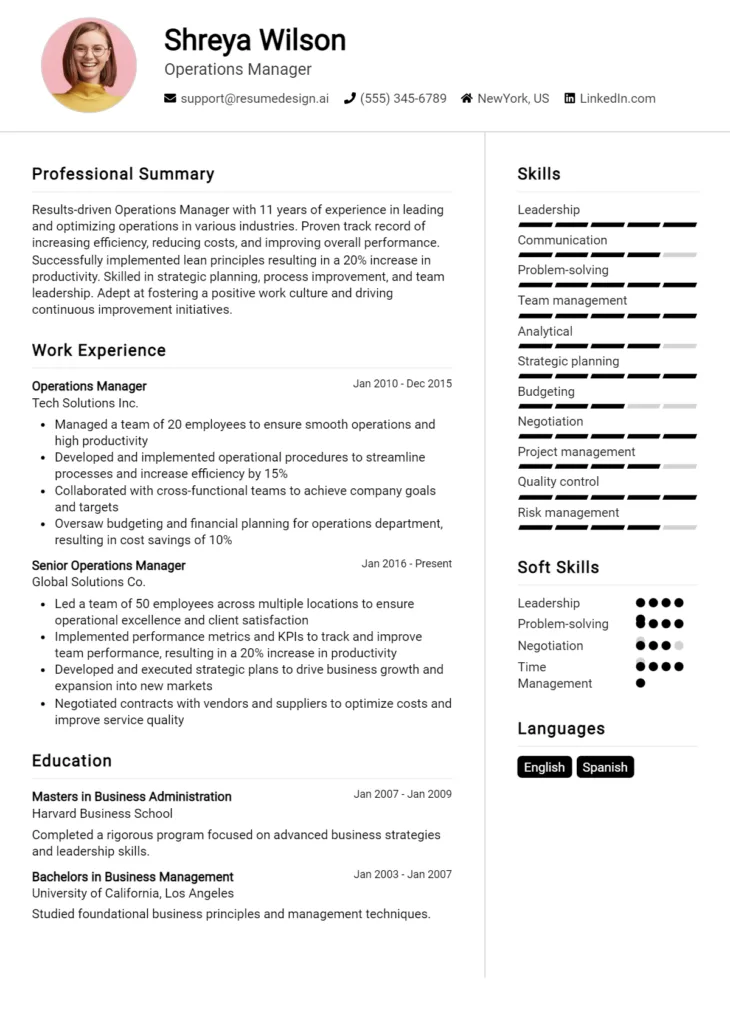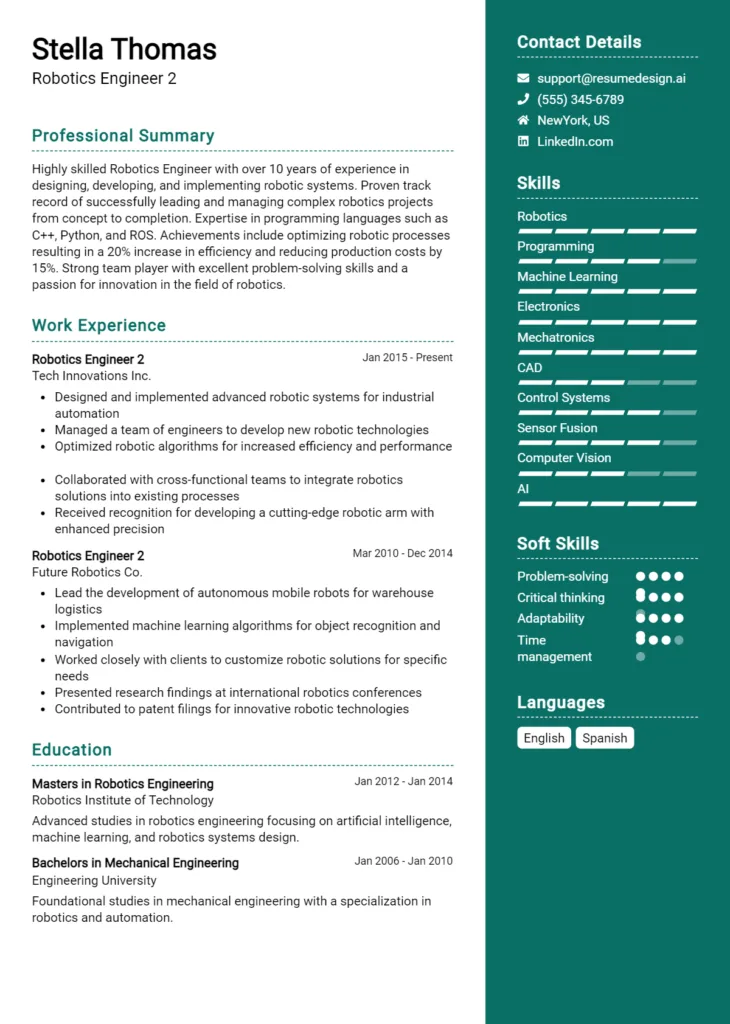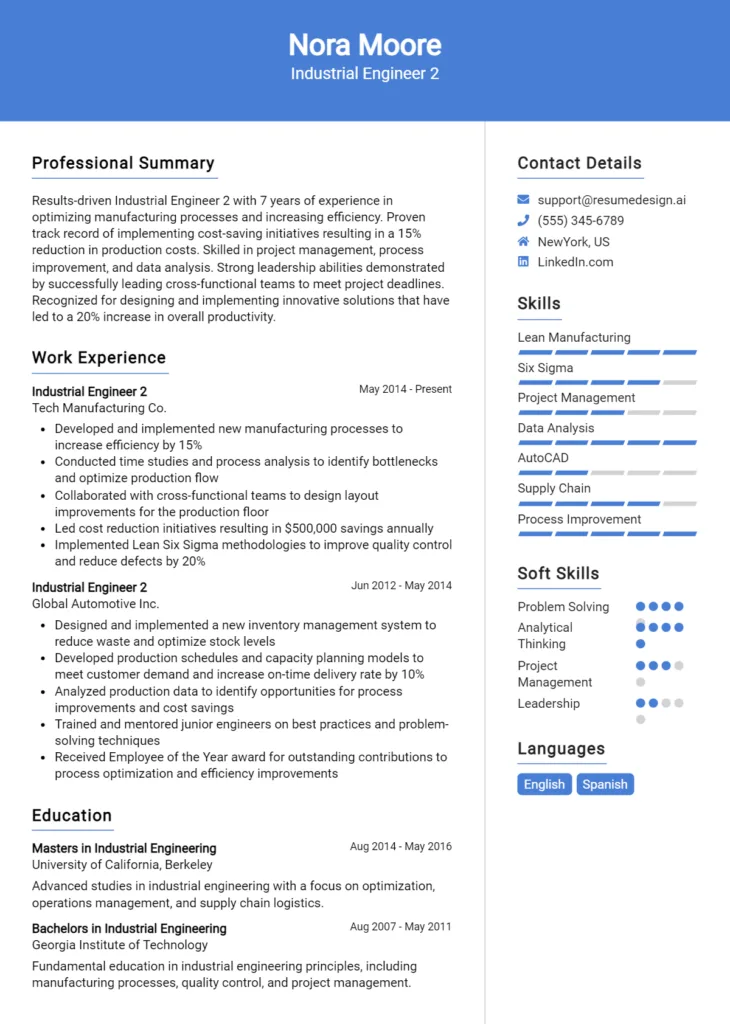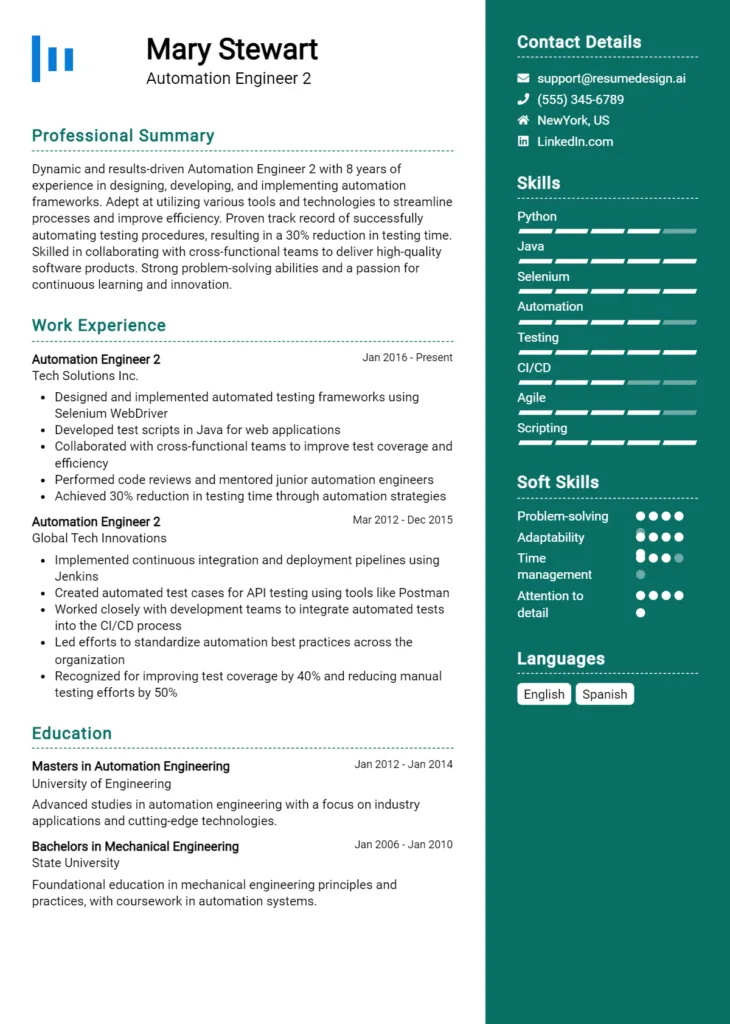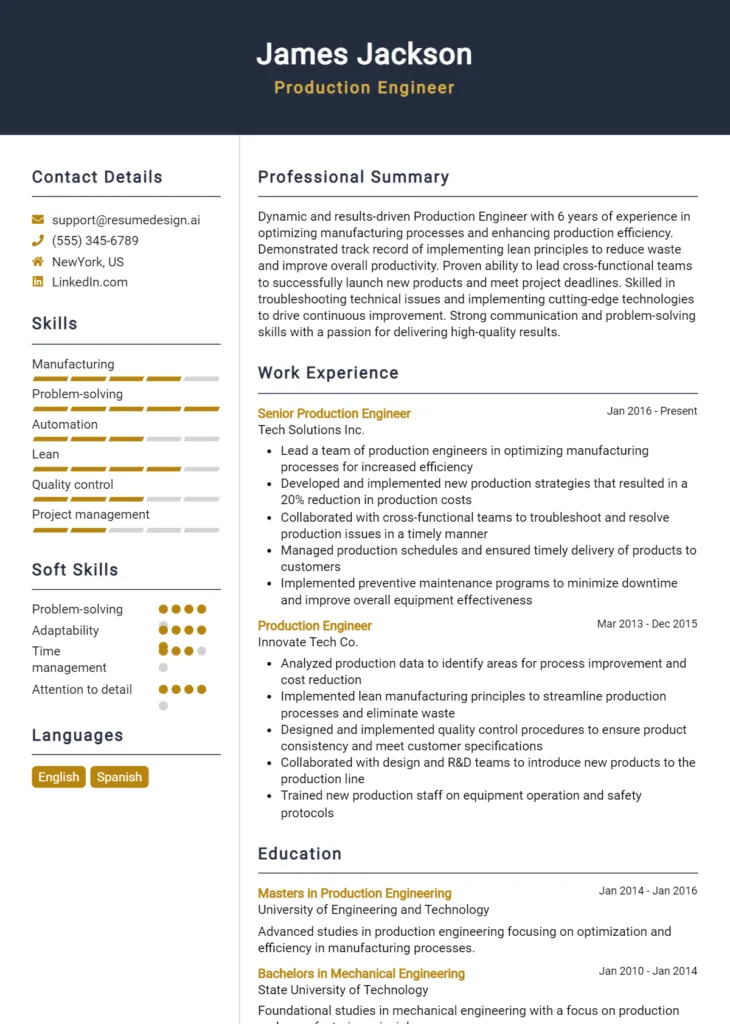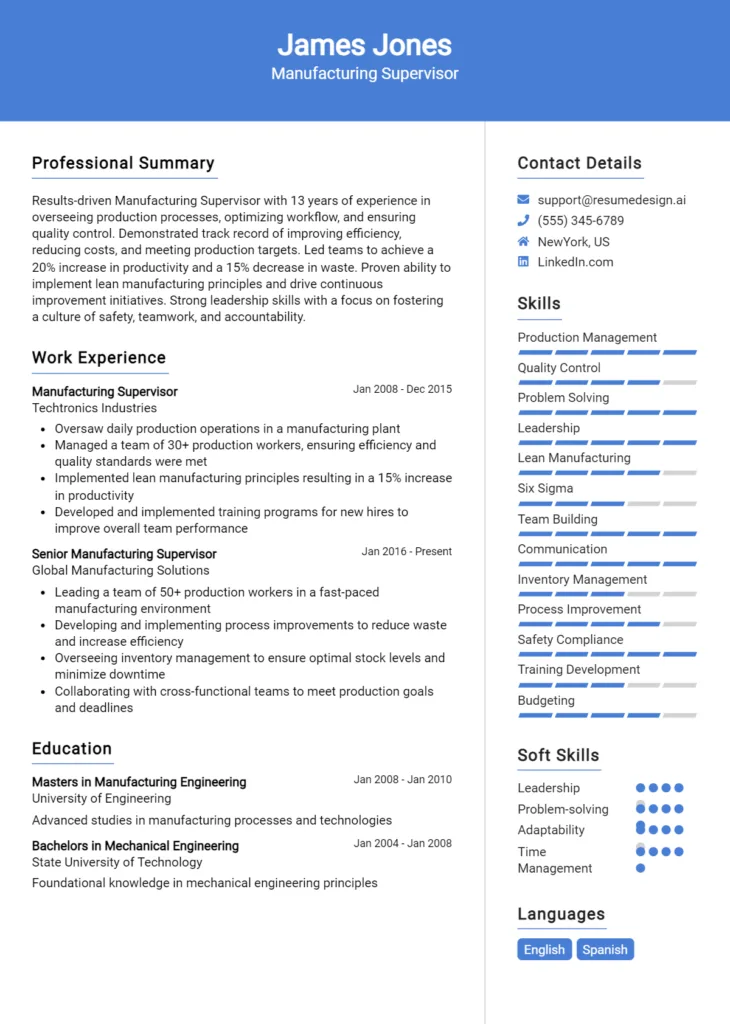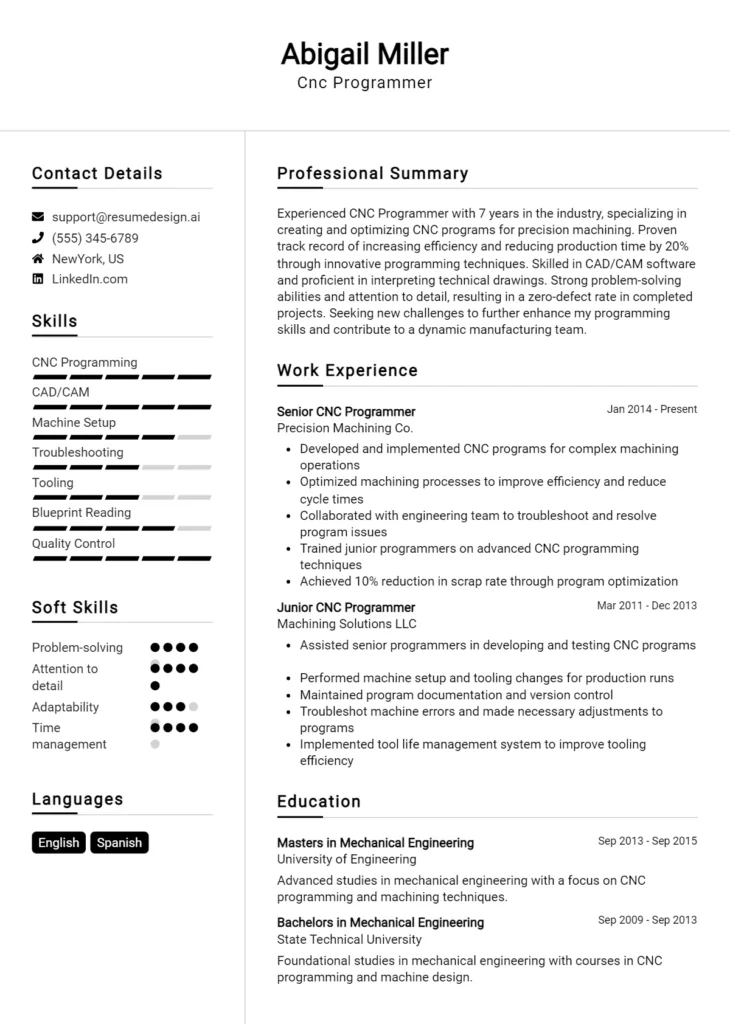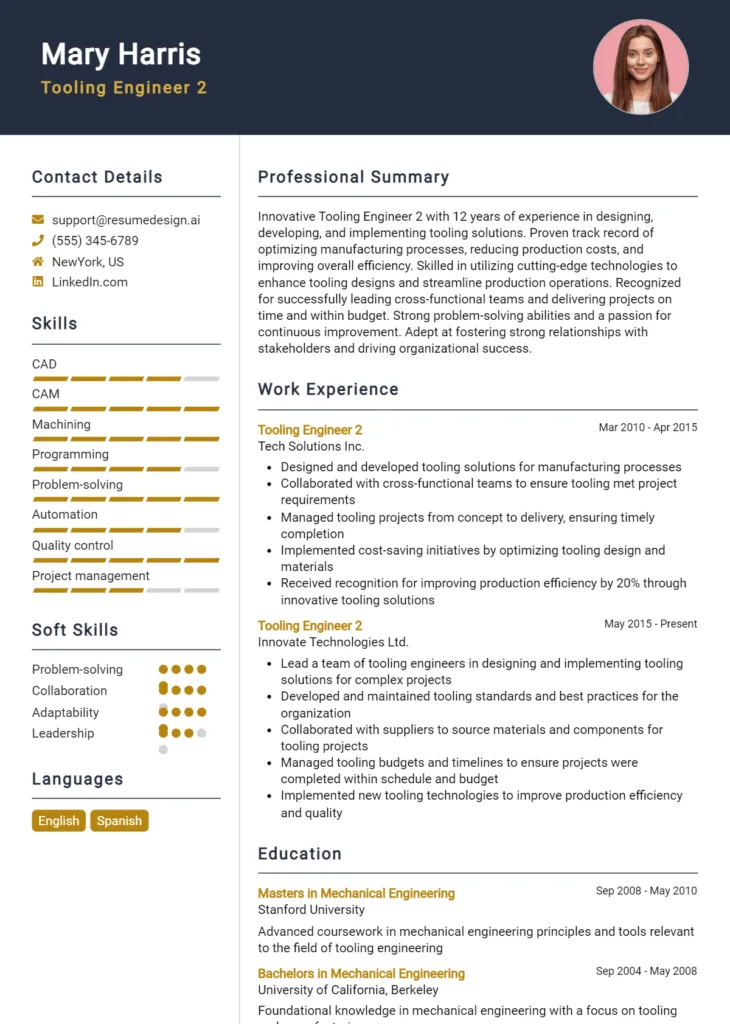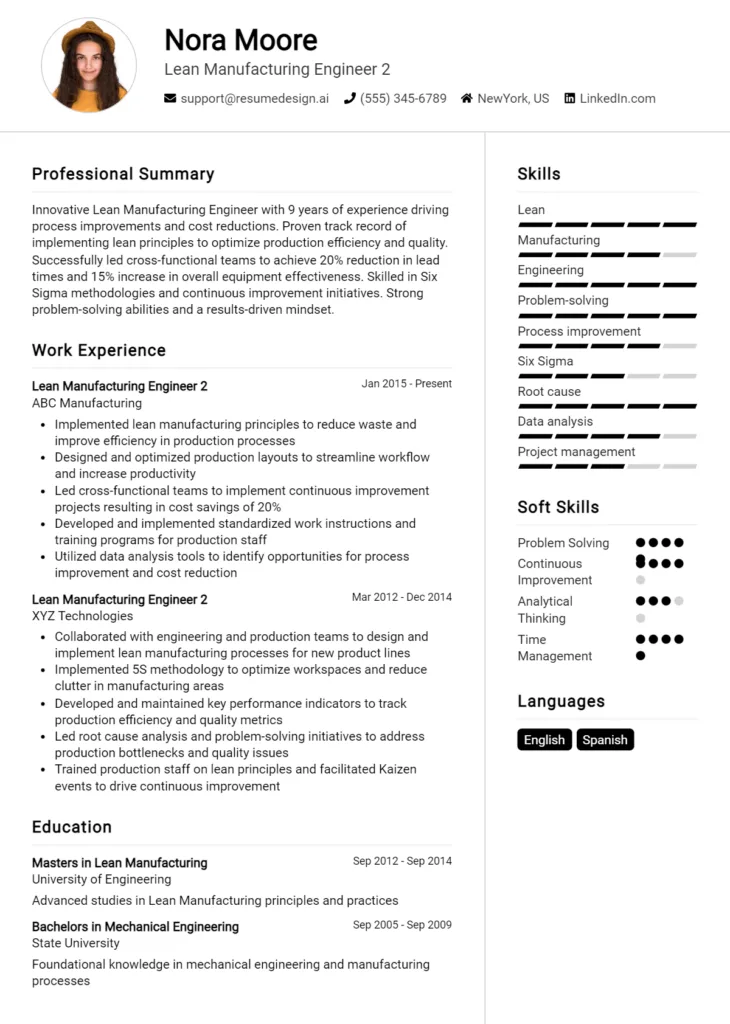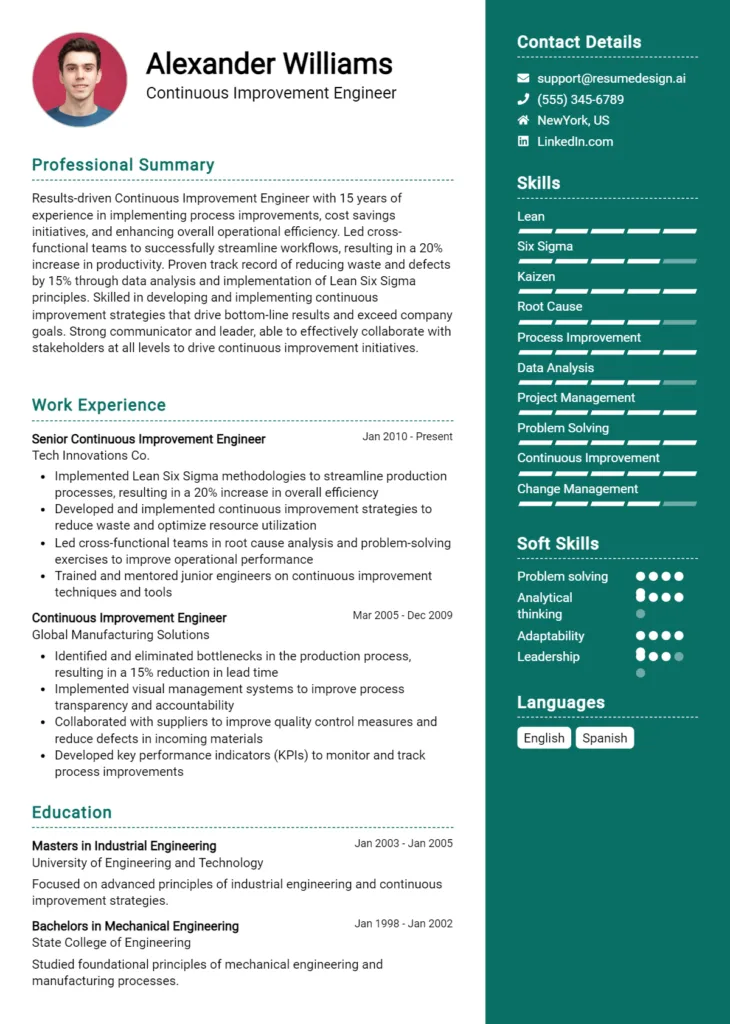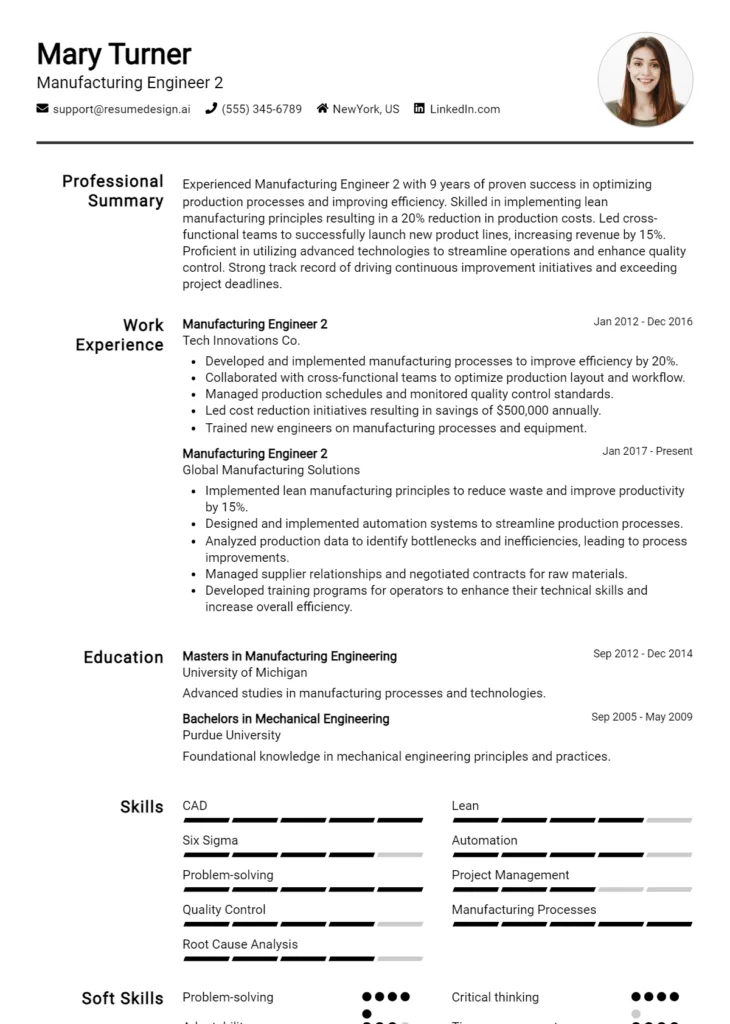Manufacturing Planner Core Responsibilities
A Manufacturing Planner is pivotal in coordinating production schedules and ensuring efficient operations across various departments. This role requires strong technical knowledge, operational expertise, and robust problem-solving skills to effectively manage resources, forecast demand, and optimize production processes. By bridging gaps between engineering, supply chain, and production teams, the Manufacturing Planner contributes significantly to organizational goals. A well-structured resume can effectively showcase these qualifications, highlighting the planner's ability to enhance productivity and streamline operations.
Common Responsibilities Listed on Manufacturing Planner Resume
- Develop and maintain production schedules to meet customer demands.
- Coordinate with supply chain and inventory management to ensure material availability.
- Analyze production data to identify trends and areas for improvement.
- Collaborate with engineering and operations teams to optimize manufacturing processes.
- Implement lean manufacturing principles to reduce waste.
- Monitor production performance and adjust plans as necessary.
- Create reports on production metrics and forecasts for management.
- Facilitate communication between departments to ensure alignment on goals.
- Assist in the development of budget plans for production activities.
- Identify and resolve production-related issues swiftly.
- Ensure compliance with safety and quality standards throughout the manufacturing process.
High-Level Resume Tips for Manufacturing Planner Professionals
In today's competitive job market, a well-crafted resume is crucial for Manufacturing Planner professionals seeking to make a strong first impression on potential employers. Your resume serves as the first point of contact and needs to effectively convey your skills, achievements, and suitability for the role. It should not only highlight your relevant experience but also demonstrate your understanding of manufacturing processes and planning strategies. This guide aims to provide practical and actionable resume tips specifically tailored for Manufacturing Planner professionals, helping you stand out in a crowded field.
Top Resume Tips for Manufacturing Planner Professionals
- Tailor your resume to the job description by using relevant keywords and phrases that align with the specific requirements of the position.
- Highlight your experience in production planning, inventory management, and supply chain optimization, focusing on roles that directly relate to the Manufacturing Planner position.
- Quantify your achievements by including metrics such as cost savings, efficiency improvements, or production volume increases to demonstrate your impact in previous roles.
- Emphasize industry-specific skills, such as proficiency in manufacturing software (e.g., ERP systems) and understanding of lean manufacturing principles.
- Include relevant certifications or training that enhance your qualifications, such as APICS certification or Six Sigma training.
- Use a clean and professional format that makes your resume easy to read, with clear headings and bullet points for quick reference.
- Showcase your problem-solving abilities by including examples of how you have addressed challenges in past planning processes.
- Incorporate soft skills that are essential for the role, such as communication, teamwork, and analytical thinking, providing examples where possible.
- Keep your resume concise, ideally one page, focusing on the most relevant information that supports your candidacy.
By implementing these tips, Manufacturing Planner professionals can significantly improve their resumes, enhancing their chances of securing interviews and ultimately landing a job in this dynamic field. A resume that effectively showcases your skills and accomplishments will position you as a strong candidate ready to contribute to the success of any manufacturing operation.
Why Resume Headlines & Titles are Important for Manufacturing Planner
In the competitive landscape of manufacturing, a Manufacturing Planner plays a crucial role in ensuring that production processes run smoothly and efficiently. When crafting a resume for this position, the headline or title is not just a formality; it serves as a powerful tool to capture the attention of hiring managers. A strong headline can succinctly summarize a candidate's key qualifications, skills, and experiences in one impactful phrase, making it easier for recruiters to assess fit at a glance. It should be concise, relevant, and directly related to the job being applied for, effectively setting the tone for the rest of the resume.
Best Practices for Crafting Resume Headlines for Manufacturing Planner
- Keep it concise—aim for one impactful phrase.
- Use industry-specific language to demonstrate expertise.
- Highlight key skills or experiences relevant to manufacturing planning.
- Avoid generic terms; be specific about your qualifications.
- Incorporate measurable achievements when possible.
- Tailor your headline to match the job description.
- Use action-oriented words to convey dynamism.
- Make sure the headline is easy to read and understand at a glance.
Example Resume Headlines for Manufacturing Planner
Strong Resume Headlines
Results-Driven Manufacturing Planner with 10+ Years of Experience in Lean Production
Strategic Manufacturing Operations Specialist Focused on Maximizing Efficiency and Reducing Costs
Detail-Oriented Planner with Proven Track Record in Supply Chain Optimization and Inventory Management
Weak Resume Headlines
Manufacturing Planner Looking for a Job
Experienced Professional in Manufacturing
The strong headlines are effective because they clearly convey the candidate's expertise, experience, and value proposition, making a distinct impression on hiring managers. They utilize specific language that aligns with the manufacturing industry, showcasing measurable achievements and relevant skills. In contrast, the weak headlines fail to impress due to their vagueness and lack of specificity, leaving the hiring manager with little understanding of the candidate's unique qualifications or fit for the role.
Writing an Exceptional Manufacturing Planner Resume Summary
A well-crafted resume summary is crucial for a Manufacturing Planner as it serves as the first impression for hiring managers sifting through numerous applications. An exceptional summary quickly captures attention by highlighting key skills, relevant experience, and significant accomplishments that align with the specific demands of the role. It should be concise yet impactful, tailored to resonate with the job description, and effectively showcase the candidate's value proposition in the manufacturing sector.
Best Practices for Writing a Manufacturing Planner Resume Summary
- Quantify achievements: Use numbers and percentages to demonstrate your impact in previous roles.
- Focus on relevant skills: Highlight skills that are directly applicable to manufacturing planning, such as inventory management, production scheduling, and process optimization.
- Tailor the summary: Customize your summary for each job application, emphasizing skills and experiences that match the specific job description.
- Showcase industry knowledge: Mention familiarity with manufacturing processes, technologies, and best practices.
- Utilize action verbs: Start sentences with strong action verbs to convey confidence and proactivity.
- Keep it concise: Aim for 3-5 sentences that encapsulate your qualifications without being overly verbose.
- Highlight problem-solving abilities: Emphasize your capacity to identify issues and implement effective solutions in a manufacturing environment.
- Include certifications or relevant education: Mention any relevant certifications or degrees that enhance your qualifications for the role.
Example Manufacturing Planner Resume Summaries
Strong Resume Summaries
Results-driven Manufacturing Planner with over 7 years of experience optimizing production schedules, reducing lead times by 30%, and managing inventory levels to meet demand forecasts. Proven ability to implement Lean principles, resulting in a 25% increase in operational efficiency.
Detail-oriented Manufacturing Planner skilled in developing efficient workflows and utilizing ERP systems. Successfully reduced production costs by 15% through strategic planning and resource allocation, while consistently meeting or exceeding delivery deadlines.
Innovative Manufacturing Planner with a track record of coordinating cross-functional teams to streamline production processes. Achieved a 20% reduction in waste and improved product quality metrics, enhancing overall customer satisfaction.
Weak Resume Summaries
Manufacturing Planner with experience in the industry looking for a new opportunity.
Dedicated professional seeking to leverage planning skills in a manufacturing role.
The strong resume summaries stand out because they quantify achievements, specify relevant skills, and demonstrate direct relevance to the role of a Manufacturing Planner. They provide clear examples of how the candidates have positively impacted their previous employers. Conversely, the weak resume summaries lack specificity and measurable outcomes, making them overly generic and less compelling to hiring managers.
Work Experience Section for Manufacturing Planner Resume
The work experience section of a Manufacturing Planner resume is critical as it highlights the candidate's technical skills, management abilities, and commitment to delivering high-quality products. This section serves as a platform to demonstrate how previous roles have equipped the candidate with the necessary expertise to navigate the complexities of manufacturing processes. By quantifying achievements and aligning experiences with industry standards, candidates can effectively showcase their value to potential employers, making a compelling case for their capabilities in the manufacturing sector.
Best Practices for Manufacturing Planner Work Experience
- Highlight specific technical skills relevant to manufacturing planning, such as proficiency in ERP systems and production scheduling software.
- Quantify achievements with metrics, such as percentage improvements in production efficiency or reductions in lead times.
- Demonstrate experience in managing cross-functional teams to emphasize collaboration and leadership capabilities.
- Use action verbs to describe responsibilities and accomplishments, creating a more dynamic and engaging narrative.
- Tailor your experience to align with the job description, showcasing relevant skills and achievements that match the employer’s needs.
- Include examples of problem-solving in manufacturing processes, highlighting your ability to overcome challenges and drive results.
- Incorporate industry jargon and standards to demonstrate familiarity with the sector and enhance credibility.
- Provide context for your achievements by briefly explaining the challenges faced and how your contributions made a difference.
Example Work Experiences for Manufacturing Planner
Strong Experiences
- Led a team of 10 in implementing a new inventory management system, resulting in a 30% reduction in stock discrepancies over six months.
- Optimized production schedules, which increased on-time delivery rates from 85% to 95% within one year, enhancing customer satisfaction.
- Collaborated with engineering and quality assurance teams to reduce product defects by 20%, thus saving the company $150,000 annually.
- Managed a project that introduced lean manufacturing techniques, which improved overall production efficiency by 25% and reduced waste by 15%.
Weak Experiences
- Responsible for planning production schedules.
- Worked with the team to improve processes.
- Performed various tasks related to inventory management.
- Assisted in quality control efforts.
The examples provided are considered strong because they highlight specific achievements, quantify results, and demonstrate leadership and collaboration in a clear and impactful manner. In contrast, the weak experiences lack detail and measurable outcomes, making them less compelling to potential employers. Strong statements provide context and demonstrate the candidate's ability to contribute significantly to a company's success, whereas weak statements fail to convey the candidate's value or expertise.
Education and Certifications Section for Manufacturing Planner Resume
The education and certifications section of a Manufacturing Planner resume is crucial as it showcases the candidate's academic background, industry-relevant qualifications, and commitment to continuous learning. This section not only highlights formal education such as degrees but also emphasizes specialized certifications and relevant coursework that demonstrate the candidate's expertise in manufacturing planning. By including this information, candidates can significantly enhance their credibility and align their skills with the specific requirements of the job role, making them more attractive to potential employers.
Best Practices for Manufacturing Planner Education and Certifications
- Include only relevant degrees that relate to manufacturing, engineering, or supply chain management.
- List certifications that are recognized within the industry, such as APICS CPIM or Six Sigma Green Belt.
- Provide details about specialized training programs or workshops attended that are relevant to manufacturing planning.
- Highlight any coursework that directly pertains to manufacturing processes, inventory management, or production planning.
- Ensure that the education section is organized chronologically, starting with the most recent qualifications.
- Use specific names for certifications and courses rather than generic terms to enhance clarity and relevance.
- Consider including online courses or MOOCs that demonstrate a proactive approach to learning new tools and methodologies.
- Keep the format consistent and professional to maintain a polished appearance throughout the resume.
Example Education and Certifications for Manufacturing Planner
Strong Examples
- Bachelor of Science in Industrial Engineering, University of Manufacturing, 2022
- Certified Production and Inventory Management (CPIM), APICS, 2023
- Lean Six Sigma Green Belt Certification, 2021
- Advanced Inventory Management Course, Online Learning Platform, 2023
Weak Examples
- High School Diploma, City High School, 2010
- Certificate in General Studies, Community College, 2015
- Outdated ISO 9001 Certification, 2010 (not relevant to current manufacturing practices)
- Basic Computer Skills Course, Local Training Center, 2018
The examples listed as strong are considered effective because they directly relate to the skills and knowledge required for a Manufacturing Planner role, showcasing both academic qualifications and industry-recognized certifications. In contrast, the weak examples lack relevance to the manufacturing field and do not reflect a commitment to ongoing professional development, making them less impactful in demonstrating the candidate's suitability for the position.
Top Skills & Keywords for Manufacturing Planner Resume
As a Manufacturing Planner, possessing the right skills is essential for ensuring efficient production processes and meeting organizational goals. A well-crafted resume that highlights both hard and soft skills can significantly enhance your chances of landing a position in this competitive field. Employers seek candidates who not only have the technical knowledge to navigate complex manufacturing systems but also the interpersonal skills to collaborate effectively with teams. By showcasing these skills on your resume, you demonstrate your ability to contribute positively to the manufacturing environment and solve challenges that arise in the planning process.
Top Hard & Soft Skills for Manufacturing Planner
Soft Skills
- Excellent communication skills
- Problem-solving abilities
- Strong organizational skills
- Adaptability and flexibility
- Team collaboration
- Attention to detail
- Time management
- Critical thinking
- Conflict resolution
- Negotiation skills
- Leadership qualities
- Decision-making capabilities
- Analytical thinking
- Customer service orientation
- Interpersonal skills
Hard Skills
- Proficiency in ERP software
- Knowledge of lean manufacturing principles
- Experience with demand forecasting
- Familiarity with inventory management systems
- Understanding of production scheduling
- Data analysis and reporting skills
- Ability to use project management tools
- Knowledge of quality control processes
- Experience in supply chain management
- Familiarity with safety regulations and compliance
- Technical drawing and specifications reading
- Proficiency in Microsoft Office Suite
- Understanding of cost analysis and budgeting
- Knowledge of materials requirements planning (MRP)
- Ability to implement process improvement initiatives
- Statistical process control (SPC) knowledge
- Experience with CAD software
By emphasizing both skills and relevant work experience, you can create a compelling Manufacturing Planner resume that stands out to potential employers.
Stand Out with a Winning Manufacturing Planner Cover Letter
Dear [Hiring Manager's Name],
I am writing to express my interest in the Manufacturing Planner position at [Company Name], as advertised on [Where You Found the Job Posting]. With a strong background in production planning and a solid understanding of supply chain management, I am confident in my ability to contribute effectively to your team and help streamline your manufacturing processes. My experience in coordinating production schedules and optimizing resource allocation aligns perfectly with the requirements of this role.
In my previous position at [Previous Company Name], I successfully developed and implemented production plans that improved on-time delivery rates by 20% and reduced inventory carrying costs by 15%. My analytical skills enable me to forecast demand accurately and identify potential bottlenecks in the production line. By collaborating closely with cross-functional teams, I have been able to enhance communication and ensure that all departments are aligned with production goals. I am proficient in using ERP systems and other planning tools, which has allowed me to maintain a high level of accuracy in production schedules and inventory management.
I am particularly drawn to [Company Name] because of your commitment to innovation and quality in manufacturing. I admire your efforts in sustainability and continuous improvement, and I am excited about the opportunity to contribute to such initiatives. I am eager to bring my expertise in lean manufacturing principles and data-driven decision-making to your organization, ensuring that we not only meet but exceed customer expectations while optimizing operational efficiency.
Thank you for considering my application. I look forward to the opportunity to discuss how my skills and experiences align with the goals of [Company Name]. I am excited about the possibility of joining your team and contributing to your continued success in the manufacturing industry.
Sincerely,
[Your Name]
[Your Phone Number]
[Your Email Address]
Common Mistakes to Avoid in a Manufacturing Planner Resume
When crafting a resume for a Manufacturing Planner position, it's crucial to highlight relevant skills and experiences that align with the job requirements. However, many candidates fall into common pitfalls that can hinder their chances of landing an interview. Avoiding these mistakes can significantly enhance the effectiveness of your resume and present you as a strong candidate. Here are some common missteps to watch out for:
Lack of Specificity: Failing to provide specific examples of past achievements or responsibilities can make your resume vague. Use numbers and data to illustrate your impact (e.g., improved efficiency by 20%).
Ignoring Keywords: Many companies use applicant tracking systems (ATS) to filter resumes. Not including keywords from the job description can result in your resume being overlooked.
Overloading with Technical Jargon: While technical knowledge is essential, using too much jargon can make your resume difficult to read. Aim for a balance that showcases your expertise without alienating non-technical readers.
Neglecting Soft Skills: Manufacturing Planners need strong communication and teamwork abilities. Focusing solely on technical skills may overlook the importance of these essential soft skills.
Using a Generic Template: A one-size-fits-all resume can fail to capture your unique experiences. Tailor your resume to each position by highlighting relevant experiences and skills.
Poor Formatting: A cluttered or overly complex layout can distract from your content. Use clear headings, bullet points, and consistent formatting to enhance readability.
Focusing on Duties Instead of Achievements: Simply listing responsibilities can make your resume blend in with others. Instead, emphasize your accomplishments and the positive outcomes of your work.
Not Updating Regularly: An outdated resume can misrepresent your current skills and experiences. Regularly update your resume to reflect your latest achievements and any new relevant skills acquired.
Conclusion
As a Manufacturing Planner, your role is crucial in ensuring that production processes run smoothly and efficiently. Throughout this article, we explored the key responsibilities associated with this position, including demand forecasting, inventory management, and production scheduling. We also discussed the importance of collaborating with various departments to optimize resource allocation and streamline operations.
To succeed in this role, it’s essential to highlight your expertise in supply chain management, analytical skills, and experience with relevant software tools on your resume. Remember, a well-crafted resume can significantly impact your job search, setting you apart from other candidates in the competitive manufacturing landscape.
Now is the perfect time to review and enhance your Manufacturing Planner resume. Make use of the resources available to you, such as resume templates, which can help you structure your information effectively. Additionally, consider using a resume builder for a seamless experience in creating a professional document, or look at resume examples for inspiration on how to showcase your skills and achievements.
Don’t forget the importance of a strong cover letter, which can complement your resume. Explore our collection of cover letter templates to craft a compelling narrative that highlights your qualifications and enthusiasm for the Manufacturing Planner role.
Take action today—revise your resume and cover letter to better reflect your unique qualifications and readiness to excel in the manufacturing industry!

